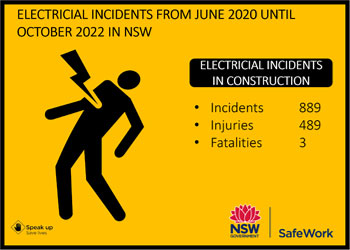Electrical inspection and testing
Electrical equipment must be regularly inspected and tested by a competent person to identify damage, wear and detect electrical faults.
'Competent person' for inspection and testing
A competent person is someone who has acquired — through training, qualification or experience — the knowledge and skills to carry out inspections and testing of electrical equipment.
The relevant Australian standards are:
- AS/NZS 3760 In service safety inspection and testing of electrical equipment and RCDs, outlines inspection, testing and tagging methods.
- AS/NZS 3012 Electrical installations — Construction and demolition sites, outlines regular inspection and testing requirements.
Regular testing requirements
The frequency of inspection and testing will vary depending on the nature of the workplace and the risks associated with the electrical equipment. The AS/NZS 3760 In service safety inspection and testing of electrical equipment and RCDs, outlines inspection, testing, tagging methods and frequency.
Details of the required frequency for inspection and testing on construction sites are set out in Australian standard AS/NZS 3012 Electrical installations — Construction and demolition sites.
Record of testing results
A record of testing must be kept until the electrical equipment is next tested, permanently removed from the workplace or disposed of. A record of testing must specify:
- the name of the person who carried out the testing
- the date of the testing
- the outcome of the testing
- the date on which the next testing must be carried out.
The record may be in the form of a tag attached to the electrical equipment tested.
Further information
The managing electrical risks in the workplace code of practice (PDF, 1337.36 KB) provides more information on inspection and testing of electrical equipment.
The electrical safety in construction inspection checklist (PDF, 196.38 KB) has been developed for principal contractors and site supervisors to assist in complying with electrical requirements when onsite.
